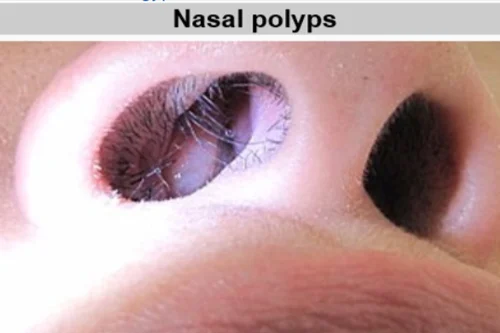Nasal Polyps
Nasal Polyps

Nasal polyps are soft, non-cancerous growths that develop on the lining of the nose or sinuses. They often form in response to long-term inflammation from conditions like allergies, asthma, or chronic sinus infections. While small polyps may cause no symptoms, larger ones can block nasal passages, leading to breathing difficulties, loss of smell, and frequent infections.
Nasal polyps can affect anyone but are more common in adults. Often, people don’t realize they have them until nasal congestion and other symptoms persist despite usual treatments.
Common Causes of Nasal Polyps
- Long-term swelling in the nose or sinuses (often from allergies or infections) can lead to polyp growth.
- Frequent allergic reactions can irritate and inflame nasal lining, increasing polyp risk.
- People with asthma, especially aspirin-sensitive asthma, are more prone to nasal polyps.
- Repeated infections can cause tissue changes that lead to polyp formation.
- Some people inherit a tendency to develop polyps or have conditions like cystic fibrosis that raise risk.
- A combination of asthma, nasal polyps, and sensitivity to aspirin or NSAIDs is seen in some patients.
Common Symptoms Of Nasal Polyps
- Constant stuffy or blocked nose
- Reduced or lost sense of smell (and sometimes taste)
- Runny nose or post-nasal drip
- Facial pressure or fullness
- Frequent sinus infections
- Snoring or breathing through the mouth
Key Facts About Nasal Polyps
- Nasal polyps are non-cancerous growths : that develop in the lining of the nose or sinuses due to long-term inflammation.
- Nasal polyps are non-cancerous growths : that develop in the lining of the nose or sinuses due to long-term inflammation.
- Nasal polyps are non-cancerous growths : that develop in the lining of the nose or sinuses due to long-term inflammation.
- They can block normal airflow and drainage : leading to nasal congestion, frequent infections, and reduced sense of smell.
- People with allergies, asthma, chronic sinusitis, or aspirin sensitivity : are more likely to develop nasal polyps.
- In some cases, surgery (like endoscopic sinus surgery) :is needed to remove polyps and clear blocked sinuses.
Nasal polyps don’t have to control your breathing or quality of life. With the right diagnosis and treatment, you can breathe easier, sleep better, and reduce infections. If you’re facing constant nasal blockage or loss of smell, don’t wait — book an appointment with our ENT specialist today and take the first step toward lasting relief.
